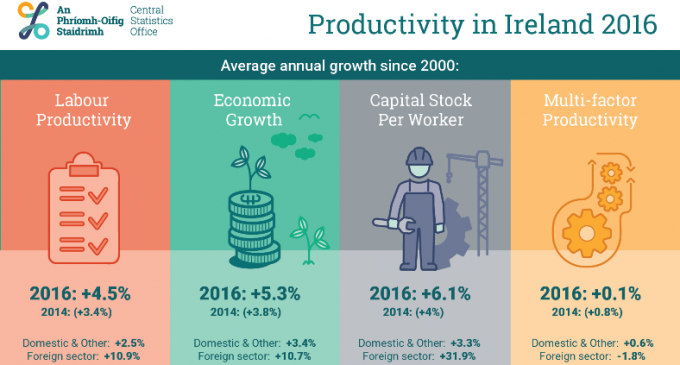Productivity in Ireland

A new publication, Productivity in Ireland 2016, has been published by the Central Statistics Office (CSO). This publication presents a comprehensive picture of productivity and economic growth in the Irish economy for the Domestic and Other Sector, and the Foreign-dominated sector in the economy since 2000.
Productivity measures the efficiency with which an economy transforms inputs into outputs. This new annual publication will help the various stakeholders in the economy understand productivity in the context of a globally-integrated Irish economy. It goes beyond standard labour productivity measures to examine the labour, capital and multi-factor productivity inputs to Irish productivity.
Increases in productivity growth are generally associated with improvements in living standards. However, in the case of the Irish economy a note of caution must be sounded because of the high concentration of foreign-owned Multinational Enterprises. There are many instances of very high productivity growth that result in a limited spillover into the Domestic and Other Sector of the economy and in turn to Irish households.
Commenting on the figures, Michael Connolly, Senior Statistician at CSO, said: “The results in this publication are based on new work by the CSO to help users understand the impact the highly globalised nature of the Irish economy has on productivity measures. As this is the first publication on productivity, the results are considered experimental. A case could be made for alternative presentations in these results; such as the exclusion of the Non-Market Sector or the exclusion of dwellings from the asset base. There could also be additional analysis by quality of labour or a more detailed analysis by economic sector or by asset type. The data available in the CSO StatBank interactive tables will enable many of these alternative presentations. We look forward to a meaningful engagement with our stakeholders once these results have been fully considered, to set priorities for future productivity analysis.”

























